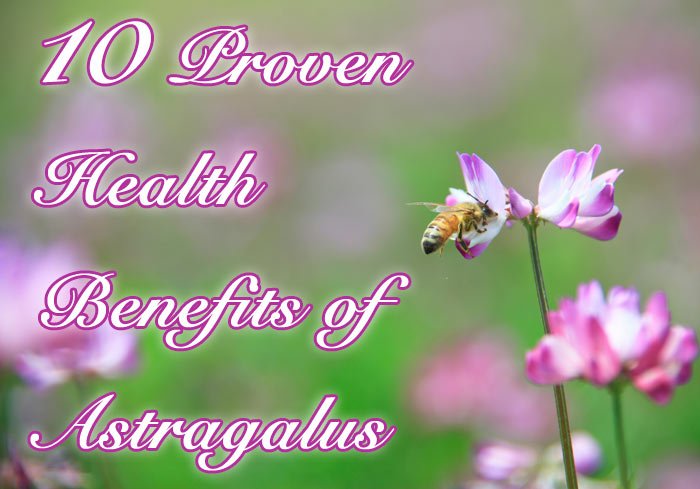Last Updated on December 27, 2017 by Marc Seward

What is Astragalus?
Astragalus is a traditionally used plant native to the northern regions of China as well as Korea and Mongolia. This perennial plant reaches about 3 feet in height and its root has been harvested for many thousands of years in Asia where it has been used in traditional Chinese medicine to protect and strengthen the body against a variety of ailments.
There are many species of astragalus but it is astragalus membranaceus which is most often used in medicine. Being an adaptogen, astragalus root is a useful ally in preventing numerous conditions both physical and emotional. The dried root of the plant is harvested from mature plants and it is the root which is used medicinally.
Medicinal uses
Despite its long history of use in Asia, it is only recently that astragalus has made a name for itself in the West and there is now a relatively healthy and still growing body of research into its medical benefits. Much of the research to date has been positive and early signs have indicated the great and diverse therapeutic potential of the herb.
Astragalus has antioxidant, antibacterial and anti-inflammatory qualities which give it a broad range of therapeutic uses ranging from heart and liver disease to common colds and allergies. If you don’t know much about astragalus and you would like to find out what it can do for you, this article will take a look at the potential benefits in some detail below.
Health Benefits of Astragalus

1. Immune system support
One of the main traditional uses of astragalus was to support and strengthen the immune system. Because of its ability to boost immunity, it has been used successfully as an early treatment and preventive measure against colds. Astragalus might be of particular interest to those whose immune system is weakened due to pre-existing illnesses.
Several clinical trials suggest that astragalus possesses significant immune boosting benefits. It helps the body to increase the production of white blood cells, produce more antibodies and strengthens the body’s antiviral immunity. One study demonstrated that astragalus could inhibit tumor growth and boost immune response in cancer patients. (1)
2. Anti-aging and Cancer
Research has revealed that astragalus can help our bodies feel younger for longer. The herb works on the aging process by protecting the cells, specifically small pieces of DNA called telomeres, from the degradation that occurs with the passing of time. Telomeres hold our DNA in shape but each time DNA replicates, they shorten by a tiny amount until they get so small that apoptosis or cell death begins.
Cell death is inextricably linked to cancer and aging and astragalus can fight this process by stimulating the production of new telomeres. Studies have shown that astragalus enables your body to produce an enzyme called ‘telomerase’ which in turn increase telomere production.
Mice treated with astragalus root extract lived longer and had longer telomeres that were less prone to degradation. (2) Astragalus can also be applied topically to the skin to help keep it tight and free of blemishes.

3. Cancer
Researchers from Texas have suggested that taking astragalus extract can prolong the life of cancer patients while studies on animals have shown that astragalus has potential anti-tumor effects against certain types of cancer including leukemia and melanoma.
Some studies have indicated that astragalus can cause apoptosis and inhibit the growth of cancerous tumors. The same studies have concluded that astragalus is extremely safe and well tolerated and warrants further research as an alternative cancer treatment. (3)
4. Chemotherapy symptoms
There is very strong evidence to suggest that the symptoms of chemotherapy can be significantly reduced by taking astragalus extract. Hospitals in China already use the herb routinely to help people recovering from cancer ease the symptoms of chemotherapy treatment. Astragalus and combinations of herbs containing astragalus can improve quality of life and help reduce nausea, diarrhea and vomiting caused by chemotherapy. (5)
5. Heart disease
A number of studies suggest astragalus can improve heart health as well as used to treat heart failure. A Chinese study published in 2001 took 83 patients with congestive heart failure and treated half of them with astragalus intravenously.
The results showed that those taking astragalus significantly improved their heart function compared with the placebo group. (4) Other studies have showed that the herb’s antioxidant properties might help prevent heart disease and lower levels of cholesterol.
6. Diabetes
Astragalus has the potential to benefit people suffering from diabetes. Although more research is required, early studies have shown that astragalus helps control blood sugar levels in diabetics. Although the exact mechanism by which it works is not fully understood, researchers have suggested that astragalus regulates important liver enzymes linked to insulin sensitivity. (6)

7. Allergies
If you suffer from seasonal allergies, astragalus might be able to help. Early studies have been positive with researchers concluding that astragalus conferred a number of benefits on those suffering from pollen allergies. (7)

8. Kidney disease
Preliminary studies suggest that astragalus might help protect the kidneys against disease which would support one of its traditional uses. . However, a review of the existing research concluded that astragalus offered some promising results but the studies up to now had not been very well designed and more evidence was needed. (8)
9. Athletic performance
Recent research published in 2014 suggests that astragalus might be of significant benefit to those wishing to improve their athletic ability and stave off fatigue. Although the study was carried out on mice, the results showed that astragalus significantly increased the muscle glycogen content and endurance capacity of mice leading researchers o believe it had potential to improve athletic performance in humans. (9)
10. Wound healing
Astragalus has antibacterial properties as well as unique polysaccharides which prevent blood flowing to wounds. Topical application of astragalus has demonstrated the ability to accelerate wound healing in rats and more research has been encouraged. (10)
How to take it
If you are interested in taking astragalus, it is commonly available in a variety of forms. Capsules and tinctures are the most popular methods of consumption but it is also available in creams and ointments that can be applied topically. In Asian clinical settings, astragalus is often used in injectable forms.
In China, astragalus has been traditionally used in cooking and the dried astragalus root can be added to soups or boiled to make a healthy tea. The recommended dose depends on a variety of factors including age, weight and the condition being treated. Make sure that you speak to your doctor or a reputable expert to out the most effective dose for your needs.
Precautions
Astragalus is considered to be very safe for the vast majority of healthy adults and no serious side effects have ever been noted. However, care should be taken in certain circumstances.
- There is no evidence regarding its safety for breast feeding and pregnant women and as is often the case with herbal supplements, it is probably best avoided.
- Evidence of its effect on children is lacking.
- Astragalus may stimulate the body’s immune system so those with autoimmune diseases should consult their doctor before taking it.
- Some doctors recommend not taking a single adaptogenic herb for a long period of time and often recommend rotating your herbal medications for best effects.
- Astragalus might interfere with drugs prescribed to suppress your immune system.
- Astragalus might cause the body difficulty in getting rid of lithium causing it to build up to dangerous levels so those taking lithium are advised to avoid it.
(1) http://www.ncbi.nlm.nih.gov/pubmed/12592686
(2) http://www.ncbi.nlm.nih.gov/pubmed/21426483
(3) http://www.ncbi.nlm.nih.gov/pmc/articles/PMC3271545/
(4) http://www.ncbi.nlm.nih.gov/pubmed/12575607
(5) http://www.ncbi.nlm.nih.gov/pmc/articles/PMC3562080/
(6) http://www.ncbi.nlm.nih.gov/pmc/articles/PMC3855992/
(7) http://www.ncbi.nlm.nih.gov/pubmed/19504468
(8) http://www.ncbi.nlm.nih.gov/pubmedhealth/PMH0069179/
(9) http://www.ncbi.nlm.nih.gov/pubmed/24595275
(10) http://www.ncbi.nlm.nih.gov/pubmed/24658979


Leave a Reply
You must be logged in to post a comment.